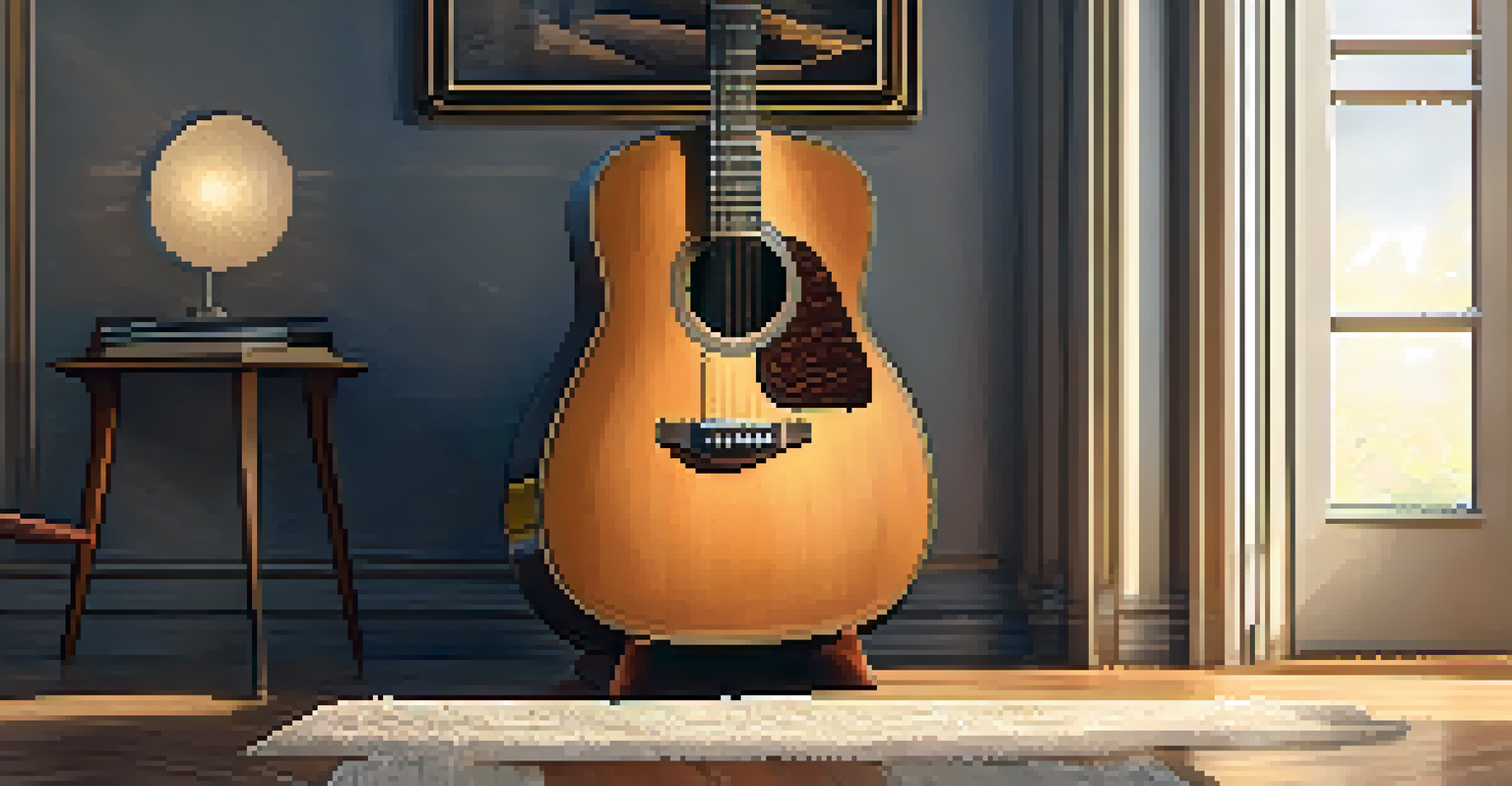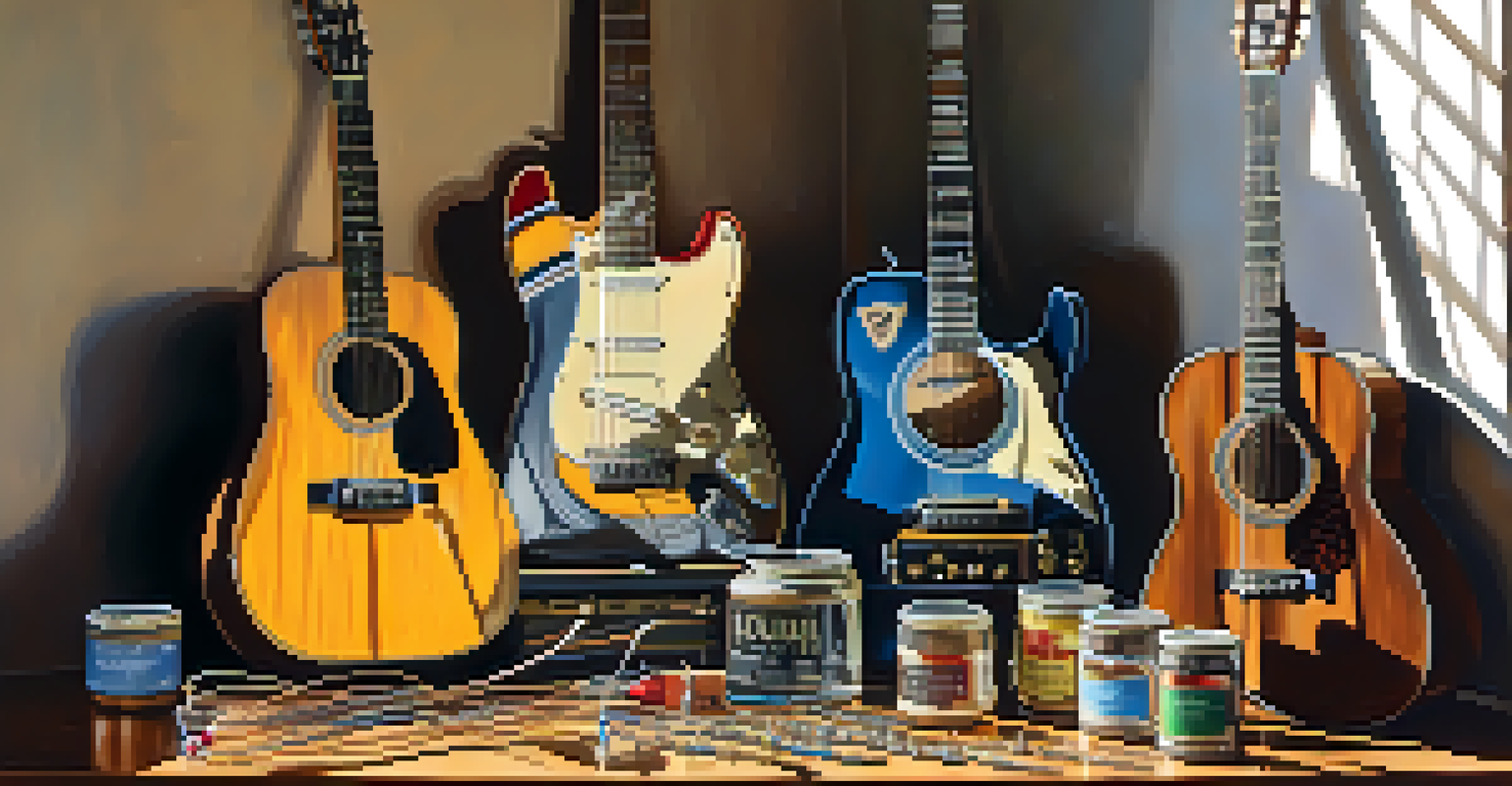How to Extend the Life of Your Guitar Strings Effectively

Understanding Why Guitar Strings Wear Out
Guitar strings wear out due to factors like sweat, dirt, and corrosion. When you play, the oils from your fingers transfer onto the strings, creating a breeding ground for grime. Over time, this buildup affects the strings' sound quality and playability, leading to a dull tone.
The beautiful thing about learning is that no one can take it away from you.
Additionally, environmental factors like humidity and temperature can impact string longevity. High humidity can cause rust, while dry conditions may lead to brittleness. Understanding these elements helps you take proactive measures to protect your strings.
Ultimately, knowing why strings wear out is the first step in preserving their life. With a little effort, you can maintain their quality and keep your guitar sounding its best.
Regularly Clean Your Guitar Strings
One of the simplest ways to extend the life of your guitar strings is to clean them regularly. A quick wipe down after each session removes dirt and oils, preventing them from corroding the metal. You can use a soft cloth or specialized string cleaner for this task.

Many guitarists find that dedicated string cleaning kits are worth the investment. These often include wipes, sprays, and tools designed specifically for string maintenance. Incorporating cleaning into your routine can dramatically improve string lifespan.
Clean Strings for Longevity
Regularly cleaning your guitar strings can significantly extend their lifespan and maintain sound quality.
Think of your strings as a delicate instrument of their own; taking care of them keeps their tone crisp and bright. A little cleaning goes a long way in ensuring your strings sound their best for longer.
Properly Store Your Guitar
How you store your guitar can significantly affect your strings' durability. Keeping your guitar in a case or on a stand, away from extreme temperatures and humidity, helps protect it from environmental damage. This is especially important if you live in areas with fluctuating weather.
Music is the shorthand of emotion.
Moreover, if you're not playing for a while, consider loosening the strings slightly. This reduces the tension on the neck and can prevent warping over time. It's a simple step that can save you from costly repairs down the line.
By creating a stable environment for your guitar, you're not just protecting the body but also extending the life of your strings. A well-stored guitar is a happy guitar!
Choose the Right Strings for Your Playing Style
Not all guitar strings are created equal; selecting the right strings for your playing style can make a world of difference. Whether you prefer light, medium, or heavy gauge strings can affect both tone and lifespan. Lighter strings may be easier to play but can wear out faster under heavy strumming.
Experimenting with different materials, like coated or uncoated strings, can also impact durability. Coated strings, for instance, are designed to resist grime and corrosion, often resulting in a longer lifespan. Finding the right fit for your playing style not only enhances your sound but also keeps your strings ringing longer.
Store Your Guitar Properly
Properly storing your guitar protects it from environmental damage and helps preserve string quality.
Think of your strings as an extension of your playing style; finding the right match leads to improved performance and longevity. It’s a personalized touch that can have a significant impact.
Avoid Excessive Finger Pressure
How you play your guitar can also affect the life of your strings. Excessive finger pressure when fretting notes can lead to premature wear. Being mindful of how hard you press can help reduce unnecessary stress on the strings.
It’s essential to find a balance between technique and pressure. Focusing on a lighter touch can not only prolong string life but also enhance your playing technique. Consider practicing scales and chords with a lighter touch to develop muscle memory.
Remember, less is often more when it comes to finger pressure. Learning to play with finesse can keep your strings bright and lively for longer.
Change Strings Regularly Based on Usage
Even with the best care, all guitar strings have a lifespan. Regularly changing your strings based on how often you play can be the key to maintaining quality sound. If you're a daily player, changing them every week or two will keep your tone fresh.
On the other hand, if you play less frequently, you might get away with changing them every month or so. Paying attention to how your strings sound and feel will guide you in establishing a change schedule that works for you.
Change Strings Based on Use
Regularly changing your guitar strings according to your playing frequency ensures optimal sound and performance.
Think of string changes as a fresh start for your guitar's voice. New strings can revive your instrument and inspire creativity in your playing.
Use String Lubricants for Extra Protection
String lubricants are a handy tool in every guitarist's arsenal. Applying a lubricant can create a protective barrier against moisture and dirt, significantly extending the life of your strings. It can also help reduce friction, making your strings feel smoother during play.
Many musicians use products specifically designed for this purpose, while others swear by household items like lemon oil. Regardless of your choice, a little lubricant can go a long way in preserving your strings’ tone and feel.

Consider string lubrication as a shield for your strings; it’s an extra layer of protection that pays off in the long run, keeping your guitar performance fresh and enjoyable.